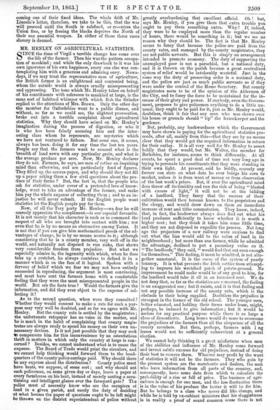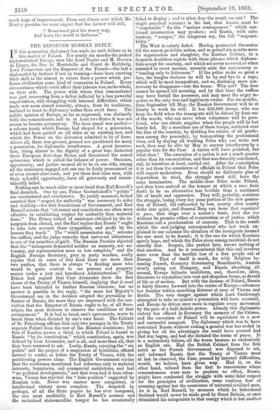MR. HENLEY ON AGRICULTURAL STATISTICS.
SINCE the time of Virgil a terrible change has come over the life of the farmer. Then his was the pattern occupa- tion of mankind ; and while the only drawback to it was his own ignorance of his own happiness, every one else was con- templating him with a generous and admiring envy. Nowa- days, if we may trust the representative man of agriculture, the British farmer is an enlightened and contented being, Whom the outside world is always cruelly misrepresenting and oppressing. The tone which Mr. Henley takes on behalf of his constituents with reference to mankind at large, is the same sort of habitual whimper with which Rob the Grinder replied to the attentions of Mrs. Brown. Only the other day the member for Oxfordshire went to a public dinner, and without, so far as we could see, the slightest provocation, broke out into a terrible complaint about agricultural statistics. Why they should have seized on Mr. Henley's imagination during the process of digestion, or who it is who has been falsely accusing him and the inter- esting class whom he represents, are mysteries which we have not ventured to fathom. But some one, it seems, always has been doing it for any time the last ten years. People say that the farmers want to conceal what is the breadth of land sown with any particular grain, and what is the average produce per acre. Now, Mr. Henley declares they do not. Farmers, he says, are men of rather an inquiring mind than otherwise, and are particularly fond of figures. They filled up the census-paper, and why should they not fill up a paper asking them a few civil questions about the pro- duce of their farms ? But, the fact is, that the people who ask for statistics, under cover of a pretended love of know- ledge, want to take an advantage of the farmer, and make him pay the whole expense of collecting them ; and to an in- justice he will never submit. If the English people want statistics let the English people pay for them.
Now, of all the Tory party Mr. Henley—we fear he will scarcely appreciate the compliment—is our especial favourite. It is not merely that his character is such as to Command the respect of all who are brought into contact with him ; nor even that he is by no means an obstructive among Tories. It is not that if you can give him mathematical proofs of the ad- vantages of change, he is by no means averse to it ; although considering that he is a county member, very well off in the world, and naturally not disposed to run risks, that shows very considerable freedom from prejudice. But what we especially admire is, the ingenuity with which, when he does take up a crotchet, he always contrives to defend it in a manner which is on the face of it logical. Spoken with a fervour of belief which we fear we may not have entirely succeeded in reproducing, the argument is most convincing, and must have sent the farmers home with a comfortable feeling that they were the most misrepresented people in the world. But are the facts true ? Would the farmers give the information, and did they ever object to the expense of col- lecting it?
As to the second question, when were they consulted ? Whether they would consent to make a rate for such a pur- pose may very well be doubted, and so far we agree with Mr. Henley. But the county rate is settled by the magistrates ; the unfortunate ratepayer has no voice in the matter, and he is much in the habit of complaining that county magis- trates are always ready to spend his money on their own un- necessary devices. Is it not just possible that they may seek too compensate him for this inconvenience by an ostentatious thrift in matters in which only the country at large is con- cerned? Besides, we cannot understand what is to cause the expense. The Board of Trade would print the circulars, and we cannot help thinking would forward them to the head- quarters of the county police carriage paid. Why should there be any expense about the distribution ? County police must have beats, we suppose, of some sort ; and why should not each policeman, on some given day or days, leave a paper at every farmhouse on his beat, instead of merely casting a scrtr- tinizing and intelligent glance over the farmyard gate? TLo police must of necessity know who are the occupiers of land in a given parish, and surely the duty of deciding at what houses the paper of questions ought to be left might be thrown on the district superintendent of police without greatly overburdening that excellent official. Oh! but, says Mr. Henley, if you give them that extra trouble you ought to pay them something extra. Why ? If, indeed, they were to be employed more than the regular number of hours, there would be something in it; but we see no reason why they should be. The fact is that Mr. Henley seems to fancy that because the police are paid from the county rates, and managed by the county magistrates, they are not public servants. But this is simply an arrangement intended to promote economy. The duty of supporting the unemployed poor is not a parochial, but a national duty, and it is thrown on the parish because a great centralized system of relief would be intolerably wasteful. Just in the same way the duty of preserving order is a national duty, and the police are just as much public servants as if they were under the control of the Home Secretary. But county magistrates seem to be of the opinion of the Aldermen of the City, and to fancy the force to be maintained for the in- crease of their glory and power. If anybody, even the Govern- ment, proposes to give policemen anythineb to do a little un- usual, they ought to be paid for it, just as Mr. Henley would, doubtless, think it fair that any man who was shown over his house or grounds should " tip" the housekeeper and the gardener. But, probably, any backwardness which the Government may have shown in paying for the agricultural statistics pro- ceeds, after all, mainly from this—that they are by no means clear that they would get the required information in return for their outlay. It is all very well for Mr. Henley to assert boldly that they would, but Mr. Walter, the member for Berkshire, for instance, seems to think differently. At all events, he spent a good deal of time not very lone ago in trying to persuade his constituents that they were standing in their owe light. At present, said ho boldly, scarcely any farmer can state on what data he ever brings his corn to market, unless it is from want of money or from observation of the last week's prices. But, if ever the agricultural mind does throw off its timidity and run the risk of being "blasted with excess of light,' it will not be at the bidding of a landlord. They fancy that the success of their cultivation would then become known to the proprietors and the clergy, and would draw down on them an immediate increase of rent and tithe commutation. They know, indeed, that, in fact, the landowner always does find out what his land produces sufficiently to know whether it is worth a higher rent ; but they think it takes him some little time, and they are not disposed to expedite the process. Not long ago the projectors of a new railway were anxious to find out what the line would add to the value of land in its neighbourhood ; but more than one farmer, while he admitted the advantage' declined to put a pecuniary value on it. "The landlords," they said, "would find that out soon enough for themselves." This feeling, it must be admitted, is not alto- gether unnatural. It is the curse of the system of yearly tenancy. It is what prevents the Irish cottier from attempt- ing to improve his wretched patch of potato-ground. No improvement he could make would be of any good to him for the landlord would take it all in an increased rent. We do not deny that, so far as the statistics are cmcerned, the feeling is an exaggerated one ; but it exists, and it is that feeling and not any possible increase of the county rate, which is the obstacle to their being supplied. Doubtless the prejudice is strangest in the farmer of the old school. The younger men, better educated, and holding their farms under lease, might, perhaps, be induced to give information • but it would be useless for any practical purpose while ;here is so large a class of dissentients. Long leases would do more to overcome the prejudices of the farmers than all the eloquence of all the county members. But then, perhaps, farmers with 1 ng leases would not be sufficiently subservient at a general election.
We cannot help thinking it a great misfortune when men of the abilities and influence of Mr. Henley come forward and invent subtle excuses for old prejudices, instead of doing their hest to remove them. Whoever may profit by the want of statistics it will not be the farmers. They who gain by the present system arc the merchants and dealers, the men who have information from all parts of the country, and, consequently, have some data from which to calculate the probibility of a rise or fall of price. The business of agri- culture is enough for one man, and the less fluctuation there is in the value of his produce the better it will be for him. But he belongs to a class who never did like change, and while he is told by ex-cabinet ministers that his sluggishness is in reality a proof of sound common sense there is not mach hope of improvement. From any dinner over which Hr. Henley presides we must expect that the farmer will still, " Homeward plod his weary way, And leave the world to darkness."































 Previous page
Previous page